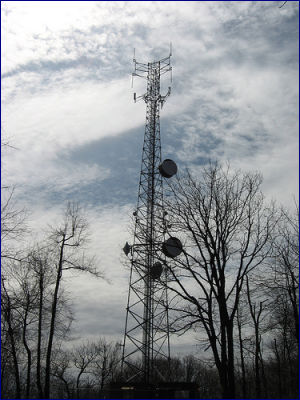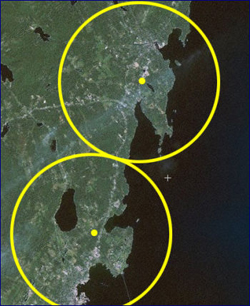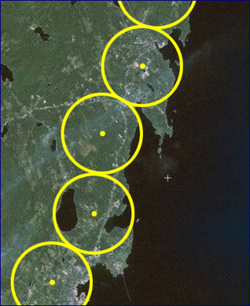Boosting Your Cell Phone Signal
A mobile phone can provide a great deal of functionality onboard a boat, from obtaining weather forecasts to sending blog posts, but all this technology only works if you can get and stay connected to cellular towers. What good is an up-to-the-minute weather forecast if you can't connect to read it? Think back to the days when mobile phones were new (and much larger). Remember going in search of that sometimes elusive signal - standing by the window, stepping outside, maybe even walking to the top of the hill? Well, on your boat you may be returning to those nostalgic times, but with a small investment and a little work, you can greatly increase your mobile network access.
Mobile phones depend on towers for a signal. Where they are located matters.
A mobile phone can provide a great deal of functionality onboard a boat, from obtaining weather forecasts to sending blog posts, but all this technology only works if you can get and stay connected to cellular towers. What good is an up-to-the-minute weather forecast if you can't connect to read it? Think back to the days when mobile phones were new (and much larger). Remember going in search of that sometimes elusive signal - standing by the window, stepping outside, maybe even walking to the top of the hill? Well, on your boat you may be returning to those nostalgic times, but with a small investment and a little work, you can greatly increase your mobile network access.
HOW IT WORKS
Your mobile phone is a radio much like your VHF radio. Electromagnetic signals are sent through the air so you can communicate with others. On your VHF radio there is a distance range outside of which you cannot reach another VHF radio (the rule of thumb is generally line of sight). This range is relatively long for your onboard VHF, which usually has a signal output of 25 watts, and quite a bit less on your handheld VHF, which generally has an output of just 5 watts. In either case, you cannot communicate unless there is another VHF radio within your signal range.
The same is true for your mobile phone, except your phone's signal is going out to cellular towers which are routing that signal to the desired location. As we are all aware, if you are out of range of the cell towers, you will not have a signal.
On our boats we have VHF antennas - typically large ones - to extend the signal range. In comparison, mobile phones have tiny antennas; most so small they are actually inside the mobile phone. Now some of you are thinking, I bought an external antenna for my mobile phone and it didn't help one bit. That is most likely true. In fact, by the end of this article you will understand why doing this can actually make your signal worse than if you had no external antenna.
So why is your cell signal often so poor on your boat? Well, the first reason is fairly obvious. On a boat we are frequently heading to remote locations. After all, isn't that the point of being on your boat - to get away? Remote areas are often underserved by mobile companies and often tend to have fewer cell towers using older technology.
WHY WORSE?
But that doesn't explain why your mobile phone service may have actually gotten worse on your boat over time. It is true that more cell towers appear every day. However, these towers are focusing on the largest population. They are therefore generally directed inward towards land and away from the water. After all, there are typically more people on land than on the sea (you may dispute this on a beautiful Saturday in July, but we assure you it is true). So even when new cell towers are installed in more remote areas, they are most likely pointing away from your boat.
A small number of towers paced along the coast, each tuned for more range. This gives some signal access offshore.
In addition, many mobile carriers are moving away from cell towers that reach out to a broad area in favor of more towers with less reach. They have found that this provides better coverage and quality - if you are on land.
There are more towers but with less range. The result is decreased access on the water.
Your dashboard VHF radio typically has 25 watts of power and your handheld VHF usually has 5 watts of power. But the FCC limits the power on a mobile phone to about 0.3 watts. That's a substantial difference. So you have a device sending out a less powerful signal using a tiny antenna. Add to this the interference from the other electronic devices on your boat and the boat itself and it is amazing we are able to get a signal at all!
THE SOLUTION?
Luckily there are a variety of inexpensive to reasonably-priced solutions available that can greatly boost your signal, allowing you to use your mobile phone in all but the most remote locations. These devices will enhance both your access to voice connections, letting you stay in touch with loved ones and giving you another form of communication in emergencies, and to data, offering increased safety and convenience through access to real time weather and marine databases.
In our next installment we'll discuss built-in solutions that offer choices of amplifiers and antennas, and require stringing cable through your boat. We'll also discuss an exciting new piece of equipment, Cell Ranger, that can increase your signal strength for a fraction of the cost of traditional amplifiers with virtually no installation!
© Karen and Jeffrey Siegel
To read this article in its entirety --
To find a host of great tips to make your cruising lifestyle more enjoyable, visit the Active Captain website --


